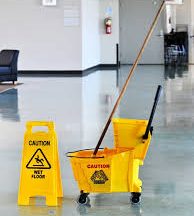 July 2020
July 2020
During the COVID pandemic communities became aware of deficiencies in practices and policies. Changes have been implemented to address heightened concern for minimizing infection risk.

Now is the time to evaluate these changes in policy, practices and communication. COVID is now one of many viruses we can expect annually.
Rethinking Cleanliness
Cleanliness has become a priority and procedures enhanced. Supplies utilized were hopefully based more on effectiveness than smell or cost. Proactive communities ensured trash chutes and dumpsters were in good condition and regularly cleaned. Hallways were vacuumed more frequently. Door handles, railings and push buttons were regularly cleaned and disinfected.
Improved and more effective cleaning procedures can make a positive impact on health and safety. Addition of one or more employees to improve cleanliness could be a wise choice ensuring fewer residents get sick each year and pass their viruses to others.
Cleaning practices enhanced during the COVID pandemic should be refined and maintained.
Should access to the management office remain restricted?
The management office is a place of business. It can also a place for residents to visit, congregate and socialize. Managers and employees, their time taken up by social visits and conversation, have less time to address the business of condominium management.
During the COVID pandemic resident access to the management office may have been restricted with communication limited to telephone and e-mail. Communities with condo management software were prepared. Resident communications were handled, and residents received timely updates as if nothing had changed.
COVID forced a level of efficiency on communities allowing for fewer staff and improved productivity. Office work may have been maintained off-site at home requiring fewer hours. This is what happens when service requests and concerns are managed electronically. Paper management is reduced. Fewer face-to-face interactions also reduce the risk of virus transmission.
Maintaining these efficiencies in the post-COVID world can result in long-term financial savings and improved service to residents.
Should resident access to concierge/security remain restricted?
During the COVID pandemic access to concierge/security was restricted. Residents were asked to communicate by phone and avoid the lobby area to minimize risk of virus transmission.
The primary task of concierge/security is building security and safety. Socializing with residents, booking amenities and other duties, unnecessary distractions from primary duties, were reduced. Resident interactions were limited to reporting of immediate or emergency problems. As with the management office, condo management software became more important.
Ongoing, similar practices can improve security by removing distractions. Condo management software simplifies booking of amenities and other activities by allowing residents to function independently while limiting interaction with concierge/security.
Should package acceptance be restricted?
By now it should be clear that package deliveries are not a luxury. With fewer items in stores, and many not expected to reopen after COVID pandemic closures, many items can only be obtained via delivery. Prior to the COVID pandemic, individuals unable to navigate busy stores or drive were dependent on package delivery.
Package delivery is not going away and is likely to continue growing. Communities have a couple of options. They can refuse package deliveries thus requiring residents to meet deliveries at the lobby door or make alternate arrangements. They can choose to find a better way to manage package volumes which requires more space and concierge/security time. Technology for helping manage packages and informing residents is readily available as part of condo management software.
Automated parcel lockers are available for communities wanting to remove concierge/security from the process. One of the many benefits is that risk of virus transmission is reduced as fewer hands touch packages and possibly transmit viruses. Another is that problem deliveries no longer impact on concierge/security resources.
As package volumes continue to grow more communities will be looking at how to better manage package volumes and reduce the burden on concierge/security.

Find Vendors in these Related Categories
- Cleaning & Janitorial Services
- Cleaning Services - Carpets
- Cleaning Services - Ducts
- Cleaning Services - Windows
- Condo Management
- Condo Software - Management Software, Electronic Voting and more
- Consultants and Condo Resources
- Home Services & Automation
- Parcel Management Solutions
- Parking Management/Cleaning Services
- Pressure Washing
- Security Services and Technologies
- Waste Services







